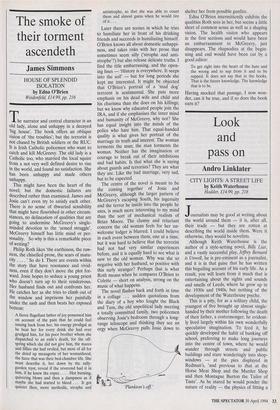The smoke of their torment aseendeth
James Simmons
HOUSE OF SPLENDID ISOLATION by Edna O'Brien Weidenfeld, £14.99, pp. 216 he narrator and central character is an old lady, alone and unhappy in a decayed 'big house'. The book offers an oblique vision of 'the troubles'; but the terrorist is not chased by British soldiers or the RUC. It is Irish Catholic policemen who want to catch and kill McGreevy. The old lady is a Catholic too, who married the local squire from a not very well defined desire to rise in the world, and found no satisfaction. She has been unhappy and made others unhappy.
This might have been the heart of the novel; but the domestic failures are described rather than examined. James and Josie can't even try to satisfy each other. There is no sense of thwarted sensibility that might have flourished in other circum- stances, no delineation of qualities that are going to undermine McGreevy's single- minded devotion to the 'armed struggle'. McGreevy himself has little mind or per- sonality. So why is this a remarkable piece of writing?
Philip Roth likes 'the earthiness, the raw- ness, the chiselled prose, the scars of matu- rity . . . . ' So do I. There are events within the story that have resonance and vivid- ness, even if they don't move the plot for- ward. Josie hopes to seduce a young priest Who doesn't turn up to their rendezvous. Her husband finds out and confronts her. He catches her as she tries to climb out of the window and imprisons her painfully under the sash and then beats her exposed bottom:
A fierce flagellant lather of joy possessed him on account of the pain that he could feel issuing back from her, his energy prodigal as he beat her for every drink she had ever grudged him, for his poor brother whom she dispatched to an exile's death, for the off- spring which she did not give him, the mares and fillies she had reviled, but most of all for the dried up menagerie of her womanhood, the farce that was their bed-chamber life. She must describe it, her down by the sally- garden tryst, reveal if the reverend had it in him, if he knew the ropes .. . Hot burning, quivering blows and then a dampness as if maybe she had started to bleed . . . It got quieter then, more methodic, strophe and antistrophe, so that she was able to count them and almost guess when he would tire of it . . .
Later there are scenes in which he tries to humiliate her in front of his drinking friends and succeeds in humiliating himself. O'Brien knows all about domestic unhappi- ness, and takes risks with her prose that sometimes seem silly ('strophe and anti- strophe'?) but also release delicate truths. I find the title embarrassing, and the open- ing lines — 'History is everywhere. It seeps into the soil' — but for long periods she kept me interested. It might be objected that O'Brien's portrait of a 'mad dog' terrorist is sentimental. She puts more emphasis on his dead wife and child and his charisma than she does on his killings; but we know why educated people join the IRA, and if she emphasises the inner mind and humanity of McGreevy, why not? She has equal insight into the minds of the police who hate him. That equal-handed quality is what gives her portrait of the marriage its truth and interest. The woman torments the man; the man torments the woman. Neither has the imagination or courage to break out of their inhibitions and bad habits. Is that what she is saying about guards and terrorists? They are what they are. Like the bad marriage, very sad, but to be expected. The centre of the novel is meant to be the coming together of Josie and McGreevy, although the larger pattern of McGreevy's escaping South, his ingenuity and the terror he instils into the people he uses, is much more interesting to my mind than the sort of mechanical realism of Brian Moore. The clumsy and reluctant concern the old woman feels for her un- welcome lodger is blurred. I could believe in each event between them, one at a time, but it was hard to believe that the terrorist had not had very similar experiences before, and it is equally hard to see what is new to the old woman. Why was she so negative with her husband, so positive with this surly stranger? Perhaps that is what Roth means when he compares O'Brien to Colette — short on analysis, strong on the music of what happens.
The novel flashes back and forth in time in a collage . . . sudden quotations from the diary of a boy who fought the Black and Tans, the old unpolitical lady meeting a totally committed family, two policemen observing Josie's bedroom through a long- range telescope and thinking they see an orgy when McGreevy pulls Josie down to shelter her from possible gunfire.
Edna O'Brien intermittently exhibits the qualities Roth sees in her, but seems a little short of common sense as well as a shaping vision. The health visitor who appears in the first sections and would have been an embarrassment to McGreevy, just disappears. The rhapsodies at the begin- ning and end would have been cut by a good editor: To get right into the heart of the hate and the wrong and to sup from it and to be supped. It does not say that in the books. That is the future knowledge. The knowledge that is to be.
Having mocked that passage, I now won- der, can it be true, and if so does the book earn it?


























































 Previous page
Previous page